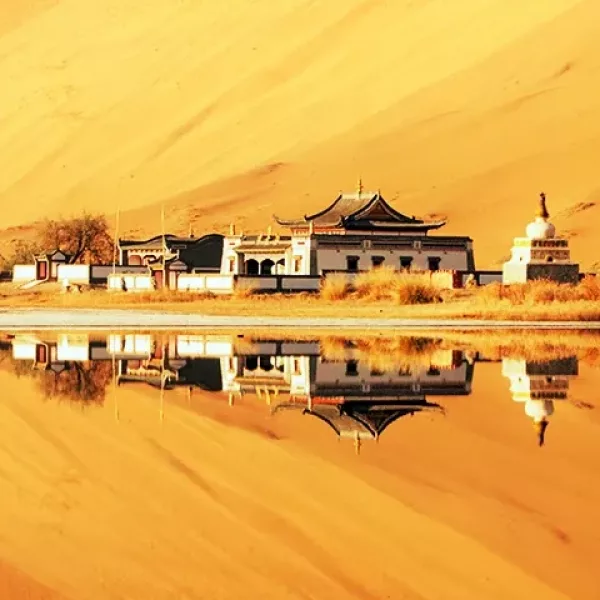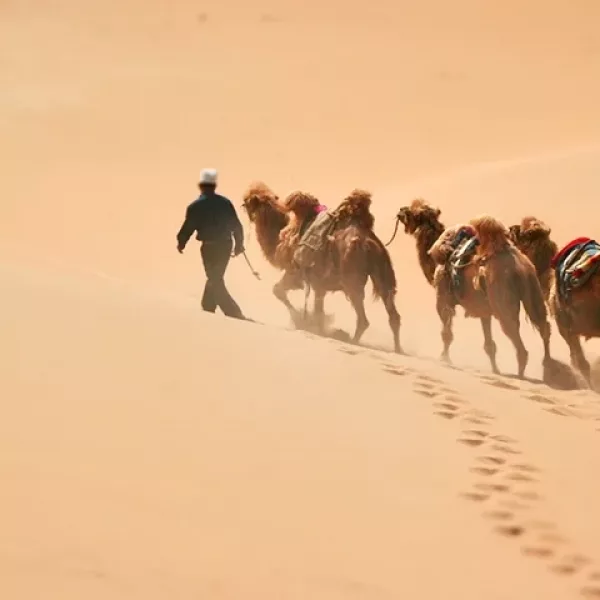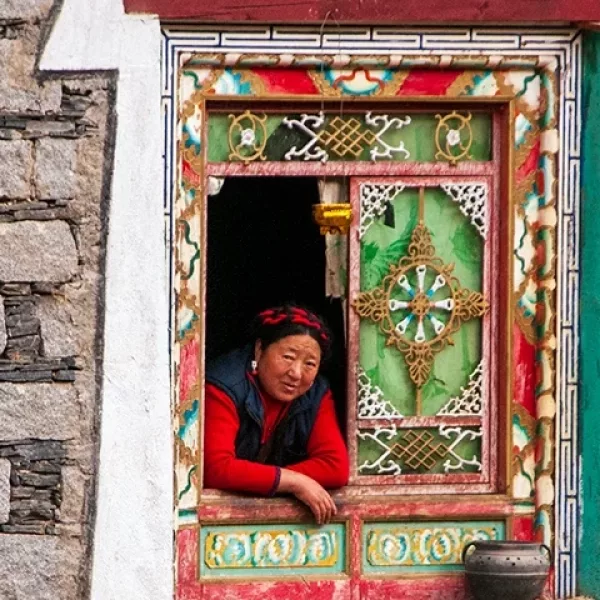Gallery
Itinerary
DAY 1 | 19 AUG 25 | ARRIVAL IN BEIJING
- Dinner
Arrive in Beijing, the capital of the world's most populous country. Beijing is a fascinating city, a mix between old and new, and a true testimony to the changes and rapid development the entire country goes through. The drive from the airport to the city center reveals old-style communist-era residential blocks slowly making way to ultra-modern skyscrapers. These accommodate the increasing number of immigrants and offices of local and international brands taking advantage of China's rapid development. Upon arriving at the hotel, and if time permits, take an orientation tour throughout the city center, amid the most prominent monumental buildings that reveal some of the city's complex history. In the evening, enjoy a welcome dinner before reverting to the hotel for a first night in China.
DAY 2 | 20 AUG 25 | FLYING FROM BEIJING TO LHASA
- Breakfast
Early in the morning, leave the hotel and drive back to Beijing airport for the morning flight to Lhasa, the Tibetan Autonomous Region's provincial capital. Commonly dubbed as the "Roof of the World", with an average altitude of 4900 meters (16,076 ft.) above sea level, Tibet is the world's highest region. The city of Lhasa lies some 3490 meters (11,450 ft.)above sea level. After landing at Gonggar Airport and meeting the local guide, embark on the one-and-a-half hours' drive to Lhasa. Once in Lhasa, take the rest of the day at a slow pace to acclimatize to the high altitude. If time (and physical condition) permit, take a leisurely walk around the bustling Barkhor, a circular street encompassing the Jokhang Temple, the holiest temple to Tibetans. Join Tibetan pilgrims partaking in the Kora, the traditional circling of significant Buddhist worship sites. For some of these pilgrims, this marks the end of a relentless journey that at times stretches over several months. Many of them have walked for hundreds of kilometers to come and pay respect in front of the Jokhang. Upon completing the walk along the Barkhor, enter the Jokhang itself. Built in the 7th century by the forefather of the Tibetan nation, King Songtesen Gampo, the Jokhang is home to the Jowo Rinpoche, the most revered Buddha statue to Tibetan Buddhists. The Jokhang is a UNESCO World Heritage Site since the year 2000, and ongoing restoration works are being conducted to bring it back to its old-age glory. In the evening, revert to the hotel for a first night in Tibet.
DAY 3 | 21 AUG 25 | TOURING LHASA
- Breakfast
Spend the third day of this Tibet private tour exploring Lhasa's main sites, some of the most revered sites to the Tibetan people. Begin at the Potala, Lhasa's most prominent structure, rising high above the city. This World Heritage Site was the dzong of all Dalai Lamas from 1645 to 1959. A dzong is a Tibetan style fortress that serves as the ruler's residence, a religious center, and civil administration offices. To date, one can find within dzongs in neighboring Bhutan a functioning monastery by the local police station, court, and treasury offices. Pause by elaborately adorned chapels, gilded tomb stupas of most former Dalai Lamas, and along the seemingly endless scripture halls, where thousands of Buddha figures are found. Leave the Potala and head to Norbulingka, the summer palace of all former Dalai Lamas. Visit the old residence of the Dalai Lama, and walk amidst the lavish gardens surrounding it. Here, many Tibetan families enjoy a day out in the sun in the cool breeze coming from the man-made lake right at the heart of the complex. Continue to Sera Monastery, one of the three prominent religious colleges of the Gelug Pa sect of Tibetan Buddhism, the sect headed by the Dalai Lama. Head straight to the shaded courtyard where ongoing theological debates take place. These debates, alongside profound hand and body gestures, indicate the degree of invincibility of the contender's arguments. After watching the nearly ecstatic debates, head back to the hotel for a second night in Lhasa.
DAY 4 | 22 AUG 25 | LHASA- EXCURSION TO DRA YERPA
- Breakfast
Drive out of Lhasa to Dra Yerpa Monastery. Located at the city's outskirts, Dra Yerpa consists of spiritual retreat caves naturally carved into a steep cliff. This is where monks used to and still are retiring for extended periods, meditate, and explore the path to enlightenment. Walk through these meditation caves, full of Buddhist sculptures and paintings, before taking a scenic walk along the Kora, circling the holy mountain just off the temple complex. On the way back to Lhasa, stop at a traditional Tibetan village, and get a first-hand encounter with rural Tibetans. Back in Lhasa, take an evening walk to the central city square, offering a view over the Potala, beautifully lit in the evening. This is a great chance to mingle with locals as they come to enjoy some time in leisure at the end of a workday.
DAY 5 | 23 AUG 25 | LHASA- THE SHOTON FESTIVAL
- Breakfast
Today join the thousands of Tibetans who celebrate the climax of the Shoton Festival. The festival spans over a few days, but the peak of the holiday is the unveiling of the great tangka (traditional religious painting with mystical motifs) over the walls of Drepung Monastery. After attending this event, which occurs only once a year, take to the open-air theater to watch the Lhamo, traditional Tibetan opera, a colorful and lively show with a history of some 700 years. Roam the streets, the urban parks, and other public gatherings to enjoy the festive atmosphere. In the evening, revert to the hotel for a fourth and last night in Lhasa.
DAY 6 | 24 AUG 25 | THROUGH YAMDROK LAKE TO GYANGTSE
- Breakfast
Leave Lhasa and head for an amazing six days of exploration deep in the Tibetan highlands. Today's destination is Gyangtse, Tibet's fourth-largest city, located at the junction of major trade routes between China, India, and Sikkim. Make a stop at Kampala (Gambala) Pass at nearly 4,800 meters (15,728 feet) above sea level for a magnificent panoramic view over the holy Yamdrok Lake, with the ever-snowed peaks of Lhagoi Kangri range at its backdrop. Continue driving along the lake's shores and pause by the small town of Nagarze for the noon break. Early in the afternoon, arrive at Karo Pass, rising at 5,036 meters (16,622 feet) above sea level. Here, embark on a short hike to the foot of Noijin Kangsang glacier. Late in the evening, arrive at the city of Gyangtse, and from the backyard of the hotel, enjoy the view of Gyangtse Dzong beautifully lit at night.
DAY 7 | 25 AUG 25 | DRIVE TO SHIGATSE
- Breakfast
Begin the day with a visit to Palkhur Choide Monastery. Dating back to the 15th century, this is the only monastery in Tibet worshiped by followers of all different sects of Tibetan Buddhism. Within the sanctuary nestled the Kumbum, a beautiful three-dimensional mandala portraying the Tibetan cosmos. After walking through the Kumbum and stopping by its different chambers and halls, drive to Rabtse Nunnery. Though the Buddhist religion invites worshippers from all genders, Tibetan Buddhism is mainly governed by a male-dominated hierarchy. This is an excellent opportunity to meet those women who have chosen to dedicate their lives to the benefit and the spiritual well-being of the community. Leave Gyangtse for the 90 km drive to Shigatse, with a stop at Shalu Monastery en route. Initially built in 1050, the temple was totally destroyed by an earthquake in 1329 and then reconstructed in 1333. It is a center of academic learning and psychic training. Its mural paintings are considered the most ancient and beautiful in Tibet. Late in the evening, arrive in Shigatse, Tibet's second-largest city, and spend the night here.
DAY 8 | 26 AUG 25 | FROM SHIGATSE TO SHAGARE
- Breakfast
Being the seat for the Panchen Lama, one of Tibet's spiritual leaders, the Tashi Lhunpo Monastery was initially constructed by the first Dalai Lama in 1447 to honor his teacher. Visit the vast monastery complex, which seems to be a city within the city, featuring a 26 meters (85 feet) high Maitreya Buddha statue at its center. Continue for a walk through the small local market and then leave Shigatse for Shagare. This is when the mighty Himalaya range would be fully exposed, adding to the overall marvelous views. After pausing by the 5,232 meters (17,165 feet) high Gyatso La, arrive in the small town of Shagare and check-in at the very basic hotel for the night.
DAY 9 | 27 AUG 25 | SHAGARE – VIEW OVER MT. EVEREST
- Breakfast
The day offers one of the highlights of any Tibet private tour. Wake up very early in the morning, and drive through the winding road to Mt. Everest, locally known as Qomolangma- The Mother Mount. Hopefully, the weather would permit a good view of the world's highest peak, and prayers for a clear sky are answered. First drive to Gyawula Mountain Pass, at 5,210 meters (17,093 feet) above sea level for the first glimpse at Mt. Everest. If lucky, get in time for a beautiful sunrise. Continue driving to the world's highest monastery, Rongbuk Monastery of the most ancient Tibetan Buddhism sect. At an altitude of 5,100 meters (16, 732 feet), the sanctuary lies at the foot of Rongbuk Glacier, accommodating some 30 monks. Climb to the monastery and enjoy the closest view of Mt. Everest any non-climber could have. In the afternoon, drive back to Shagare for a second night here.
DAY 10 | 28 AUG 25 | DESCENDING TO GYIRONG
- Breakfast
Leave Shagare and head towards Gyirong Valley. En route, stop by the picturesque Paiku Lake, offering a view over Mt. Shishapangma, the world's 14th highest peak at 8,027 meters (26,335 feet) above sea level. This is the only peak of over 8,000 meters entirely within the territory of Tibet, and thus, a great source of pride to the Tibetan people. Gyirong Valley was, until quite recently, off the charts for most foreign visitors to Tibet. Being the deepest of the five mid-Himalayan valleys, Gyirong offers one of Tibet’s most dramatic scenes. It is probably one of the most fertile of all valleys, in contrast to the dry highlands typical to Tibet. After pausing by Kongtang Lamu Pass at 5,236 meters (17,178 feet), begin descending deep into the valley. The arid landscape would abruptly change into thick pine forests covering the walls of the dramatic canyon walls towering along the roadside. Late in the evening, arrive at the city of Gyirong. This very typical border town has the usual spooky ambiance about it and feels as if much more is happening underground and amid shady streets than what meets the eye. Set in for the night in a very basic hotel (third in a row, and last one for this trip).
DAY 11 | 29 AUG 25 | CROSSING THE BORDER TO NEPAL
- Breakfast
The last drive within Tibet would probably be one of the most beautiful of them all. Drive through the lower part of Gyirong Valley, enjoying this lower region's lush greenery and fertile lands as the elevation drops dramatically. At the bottom of the valley, drive along the Gyirong Zangboo river, which changes its name to Trisuli once it crosses the border into Nepal. Late in the morning, reach the border post between China and Nepal. Though only a tiny bridge over the river separates the two nations, a quick look at the newly constructed terminal on the Chinese side and the chaotic market-like border post on the Nepalese side tells a lot about the balance of powers in the region. After the unavoidable immigration processes on both sides of the border, embark on a six-hour ride through a rather rough road along the Nepalese rural area. Late in the evening, arrive in Kathmandu. If time permits, take a walk through the Thamel- the backpacker's district at the heart of the Nepalese capital city, before driving to the hotel for the night.
DAY 12 | 30 AUG 25 | TOURING KATHMANDU
- Breakfast
Leave the hotel for a full day of exploring the Nepalese capital city and its surroundings. Begin with a visit to Boudhanath Stupa, also known as "Little Tibet" due to its popularity with Tibetan pilgrims. This UNESCO World Heritage Site is one of the oldest monuments in the entire Kathmandu Valley. On to Pashupatinath, the main temple for Hindus in Kathmandu. Forbidden to all non-Hindus, visitors can see the cremation ceremonies taking place on the Bagmati River banks, right outside the temple. This is also a popular site for Sadhus, those who chose to disengage from materialistic life and dedicate their lives to spiritual discipline. Just like Boudhanath, Pashupatinath was declared a UNESCO World Heritage Site back in 1979. End the day at Bhaktapur, locally known as Bhadgaun, the city of devotees. The city was the center of one of three ancient kingdoms that ruled the Kathmandu valley in ancient times. It is often referred to as Nepal's best-preserved heritage site, dotted with sites such as the Fifty-five windows palace, the Nyatapol, the five-storied temple, the Royal Bath, Pottery square, and Dattatreya temple, all significant and impressive sites scattered around Bhaktapur. In the evening, return to the hotel in Kathmandu for the last night of the trip.
DAY 13 | 31 AUG 25 | DEPARTURE FROM KATHMANDU
- Breakfast
After breakfast at the hotel, drive to Kathmandu airport for the departing flight out of Nepal.
Dates & Pricing
19th August, 2025–31st August, 2025
Tibet private tour rates are quoted in US Dollars.
Note: Tibet private tour rates are valid all year round but are not valid for trips that occur (in whole or in part) during Chinese national holidays:
New Year (1-3 Jan 2025)
Chinese Spring Festival (28 Jan-03 Feb 2025)
Qingming Festival (4-6 Apr 2025)
Labor Day Holiday (1-5 May 2025)
Dragon Boat Festival (31 May - 2 Jun 2025)
Mid-Autumn Festival (5-7 Oct 2025)
National Day (1-7 Oct 2025)
Trips@Asia reserves the right to change Tibet private tour prices and programs due to changes in flight schedule, changes in airfares, and other local circumstances.
Prices are based on twin share occupancy.
Rates for private groups of 2 travelers and above:
2 travelers- US$4,379/ person
4 travelers- US$3,417/ person
Additional Information
- Accommodation as per program including breakfasts
- Flight Beijing - Lhasa
- English speaking guide for each region
- Transfers by A/C vehicle
- All entrance fees as per program
- Tibet tour permit
Tibet tour permit requires all travelers to send a copy of their passport's first page & Chinese tourist visa at least 45 days prior to first day of the trip
- International airfare to Beijing and from Kathmandu
- Chinese tourist visa
- Nepalese tourist visa (can be issued on arrival at the Nepalese border for most nationals)
- Travel insurance, or insurance of any kind
- PCR/COVID tests, or any tests that might be required for international or domestic travel
- Expenses that might incur due to the results of COVID tests before, during or after the tour
- Meals other than those specifically mentioned in the program
- Excess luggage
- Gratuities
- Anything not mentioned in the program
- Beijing: Park Plaza Wangfujing 4-star
- Lhasa: Four Points by Sheraton 4-star
- Gyangtse: Gyangtse Hotel 3-star (best available)
- Shigatse: Qomo Langzong 4-star
- Shagare: Qomolangman Hotel 2-star (best available)
- Gyirong: Kyirong Hotel 2-star (best available)
- Kathmandu: Shambala Hotel 4-star
Note: the above listed hotels are tentative, and shall be confirmed only upon confirmation of the trip.





































